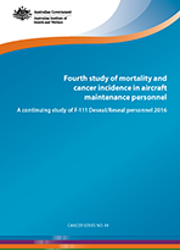Fourth study of mortality and cancer incidence in aircraft maintenance personnel: a continuing study of F-111 Deseal/Reseal personnel 2016
Citation
AIHW
Australian Institute of Health and Welfare (2016) Fourth study of mortality and cancer incidence in aircraft maintenance personnel: a continuing study of F-111 Deseal/Reseal personnel 2016, AIHW, Australian Government, accessed 25 April 2024.
APA
Australian Institute of Health and Welfare. (2016). Fourth study of mortality and cancer incidence in aircraft maintenance personnel: a continuing study of F-111 Deseal/Reseal personnel 2016. Canberra: AIHW.
MLA
Australian Institute of Health and Welfare. Fourth study of mortality and cancer incidence in aircraft maintenance personnel: a continuing study of F-111 Deseal/Reseal personnel 2016. AIHW, 2016.
Vancouver
Australian Institute of Health and Welfare. Fourth study of mortality and cancer incidence in aircraft maintenance personnel: a continuing study of F-111 Deseal/Reseal personnel 2016. Canberra: AIHW; 2016.
Harvard
Australian Institute of Health and Welfare 2016, Fourth study of mortality and cancer incidence in aircraft maintenance personnel: a continuing study of F-111 Deseal/Reseal personnel 2016, AIHW, Canberra.
PDF | 3Mb
Between 1974 and 2000, the Royal Australian Air Force undertook a series of formal Deseal/Reseal (DSRS) programs, alongside informal repair activities, to correct fuel leaks inside the fuel tanks of F-111 aircraft. A number of concerns were raised about health outcomes in personnel who worked on these programs and associated activities. The repair work was suspended in 2000, and a series of inquiries and health studies followed. This report presents the findings of the fourth iteration of a series of studies on mortality and cancer incidence of F-111 DSRS personnel. The report will be a valuable resource for policy makers, program managers and health professionals interested in health outcomes of Australian Defence Force personnel.
- ISSN: 2205-4855 (PDF) 1039-3307 (Print)
- ISBN: 978-1-74249-956-7
- Cat. no: CAN 98
- Pages: 119
-
F-111 Deseal/Reseal personnel were 23–30% more likely to be diagnosed with cancer than non-exposed personnel
-
F-111 Deseal/Reseal personnel experienced 27% lower mortality compared with non-exposed Amberley personnel



